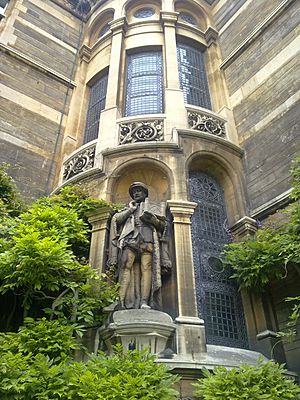Stephen Perse facts for kids

Stephen Perse (born 1548 – died September 30, 1615) was an English scholar, doctor, and generous person (a philanthropist). He is famous for starting schools that still use his name today.
Stephen Perse's Life Story
Stephen Perse likely went to Norwich School when he was younger. Later, he studied at Gonville and Caius College, Cambridge, where he earned his first degree in 1569. He became a "fellow" there, which means he was a senior member of the college, often involved in teaching and research.
In 1573, he became a priest and deacon in the Church of England. However, he was later allowed to change his focus to medicine. He then earned his Doctor of Medicine degree in 1581, becoming a physician.
Stephen Perse became quite wealthy, gathering about £10,000. This money probably came from making profits on loans he gave to businesses. He used his wealth to help his community. He gave money to the University Library and helped build a road, which is now called Maid's Causeway. He also helped create a public water supply for Cambridge, bringing water from springs at Nine Wells through a stream known as Hobson's Conduit.
Stephen Perse is remembered at Caius College. There is a memorial for him in the college chapel. The college also holds an annual "Perse Feast" to honor him.
Founding Schools for the Future

In his will, Stephen Perse left a large amount of money to create "a Grammar Free Schoole." This school was meant to teach 100 students who were born in Cambridge or nearby areas like Barnwell, Chesterton, or Trumpington. Some of these boys could even get scholarships to continue their studies at Gonville and Caius College. He also planned for small homes called almhouses for six poor widows next to the school.
In 1615, the Perse School was officially started in Cambridge. A special sign, called a blue plaque, marks the school's original location in Free School Lane. This spot is now home to the Whipple Museum.
The motto of the Perse School is Qui facit per alium facit per se. This Latin phrase is usually understood to mean "He who does things for others does them for himself." The ending "per se" is a clever play on Stephen Perse's last name. Later, in 1881, the Perse School for Girls was founded. Both schools are now part of the Stephen Perse Foundation, continuing his legacy of education.
 | Shirley Ann Jackson |
 | Garett Morgan |
 | J. Ernest Wilkins Jr. |
 | Elijah McCoy |

